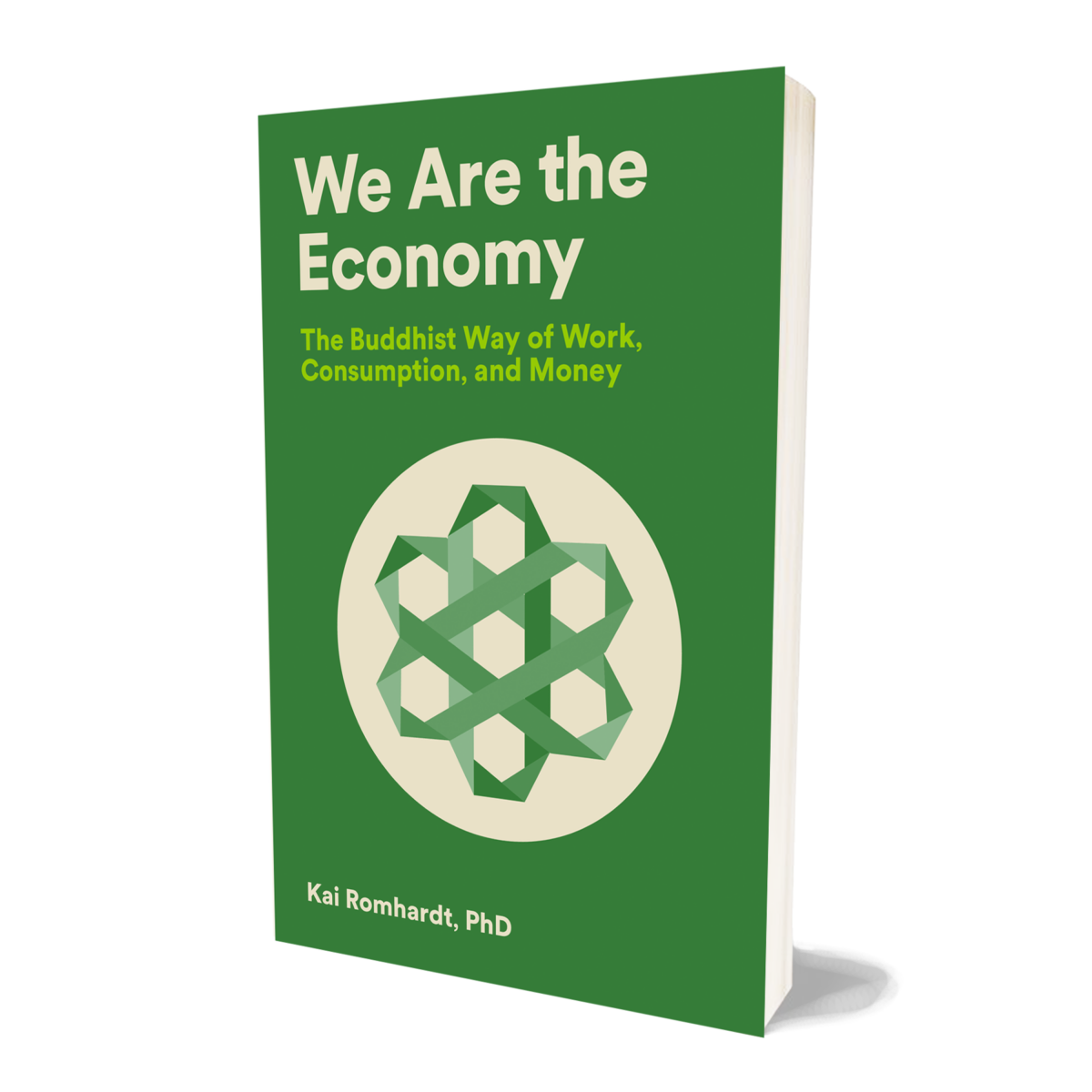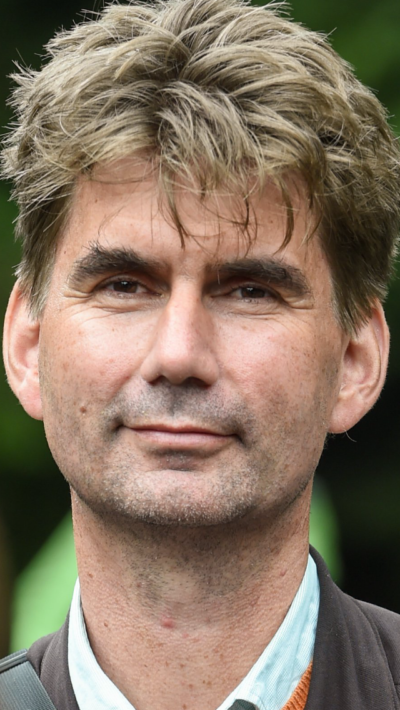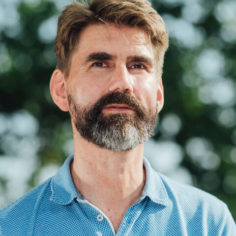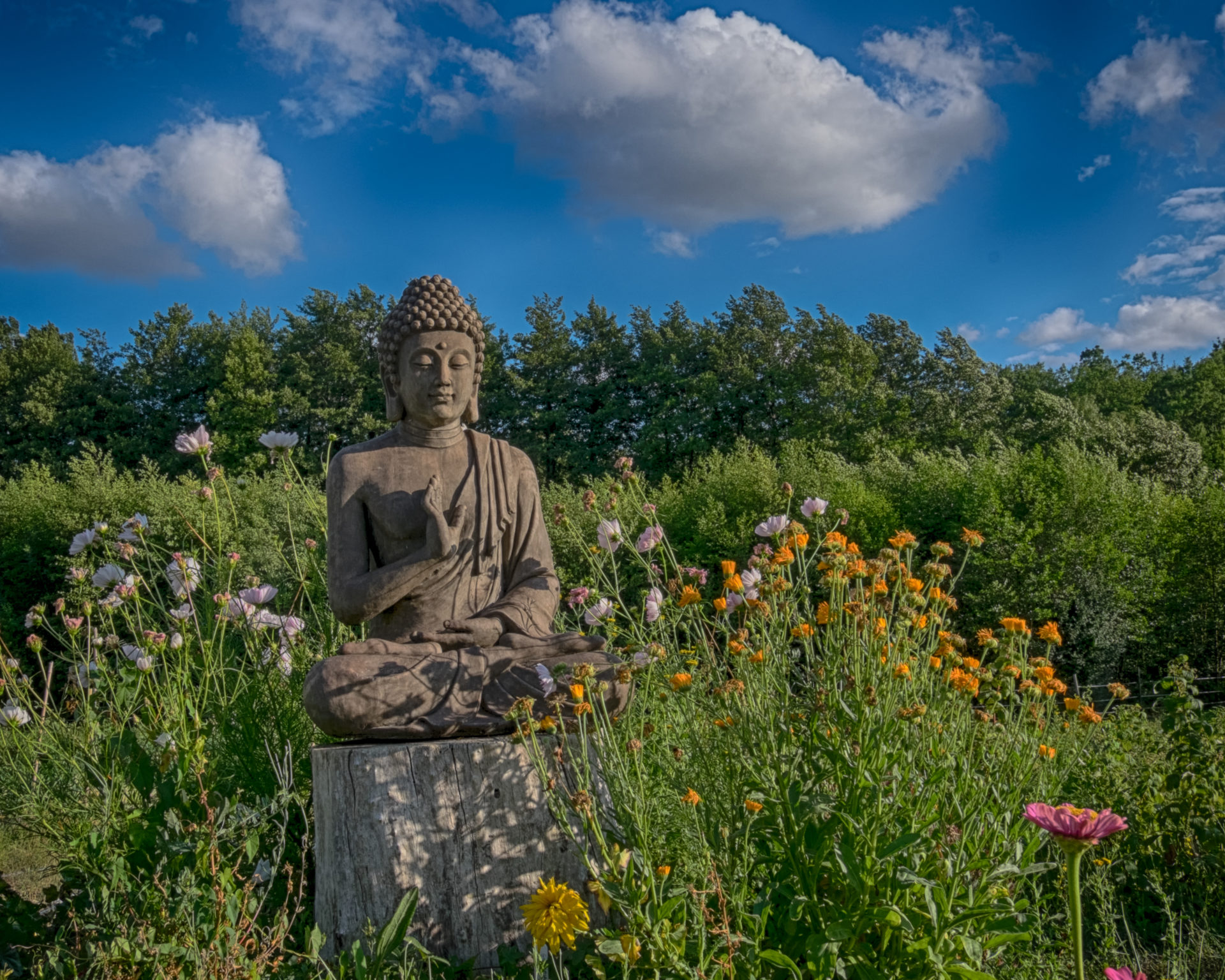Excerpts from We Are the Economy
By Kai Romhardt in June 2020
In We Are the Economy, Dharma teacher Kai Romhardt proposes a minimalist, awareness-based strategy that totally reconfigures our core economic relationships: work, consumption, and money. We offer the following excerpts from the book to support your practice in the workplace.

Economic processes permeate our lives.
Excerpts from We Are the Economy
By Kai Romhardt in June 2020
In We Are the Economy, Dharma teacher Kai Romhardt proposes a minimalist, awareness-based strategy that totally reconfigures our core economic relationships: work, consumption, and money. We offer the following excerpts from the book to support your practice in the workplace.

Economic processes permeate our lives. We work. We shop. We borrow money or invest money. Simply by working, consuming, and managing our money, we support and perpetuate everything we refer to as the economy. In fact, we are this economy. But does our current economic system truly serve us and contribute positively to our happiness in life?
All human beings long for a sense of community, love, trust, and understanding. Our work, our behavior as consumers, and our money can and should support us in this endeavor. Our common objective should be to foster a meaningful economy that in turn creates more meaning and purpose in our lives. Yet, our current version of the economy not only disappoints us—it makes many of us angry. Economic and financial crises create an atmosphere of fear and insecurity. Many companies operate under increased stress, pressure, and competitive thinking. Meaningfulness and joy are not prioritized at work, and excess and greed undermine our trust in the economic elite.
How did this happen? What is going wrong? How did we foster an economy that doesn’t take care of our deepest needs, that weakens our communities, that increases our fears and discontent and constrains our hearts?
In times of crisis, we feel victimized. We are the victims of greedy investment banks, incompetent politicians, unforgiving market paradigms and cold managers, who cut jobs or move them abroad. We seem to be the silent observers of a powerful system that envelops, molds, and restricts us in the form of prices, wages, liabilities, taxes, jobs, and logistics. To resign ourselves to being only observers, however, is inaccurate and dangerous.
An economy doesn’t simply happen to us. The economy is not a self-sufficient system that exists beyond our sphere of influence. Nor is it an event that we watch as powerless spectators. We are active participants: we shop, sell, save, and borrow money on a daily basis. We work or we don’t. We develop needs, which we meet in some way; some of those ways make a meaningful impact, while others are harmful. We consume responsibly or excessively; we buy consciously or unconsciously; we support meaningful or senseless endeavors. We are either unhappy or happy with our lives. It can go either way.
Every day we choose anew. Even though larger economic structures hold a good deal of influence, we are freer than we think. This freedom is equally wonderful and challenging. We realize that the economy is no hard and steadfast law of nature, but rather an expression of our individual and collective spirits.
Every day we have the opportunity to move the economy in a more meaningful direction. As we buy and consume more mindfully, invest and borrow more consciously, and work with greater awareness, we create a micro-economy that differs greatly from the macroeconomic system. Millions and billions of these small, medium-sized, and larger economic activities can weave, day by day, a new economy and create the potential for positive change.
Humankind has produced a different kind of economic behavior in each of its developmental phases. As our attitudes change, our economy changes. I invite you to explore a fresh, practical look into core economic issues. Which theories, concepts, and structures can we trust? What kind of an economy do we want?
In our pursuit of happiness as individuals and as a society, we have come to rely on several central economic concepts: economic growth, competition, efficiency, return on investments, rivalry, and performance, among others. We evaluate ourselves according to these standards. Yet, do these ideas contribute to our happiness? Fewer and fewer people can accept the promises of economists, corporate leaders, and politicians that economic growth, flourishing companies, and rising share prices will guarantee the “good life” for us all. Our entire society is ridden with a confidence crisis. If we take a close look, we can recognize the toxic nature of a whole range of economic concepts.
Rivalry and competition are regarded as the cardinal virtues of the market economy. Yet competition creates stress, polarization, and tension on all levels of our society. As we take a deeper look, we recognize that many problems of modern societies like stress, burn-out, depression, restlessness, scarcity, and poverty are fueled by the idea of competition. We can never have enough. We are never secure. In many areas, our economy has been disconnected from our real needs. The economy doesn’t make us happier, more content or compassionate, but instead increases our suffering, nurtures our discontent, and weakens our communities. During the last few decades, we allowed certain economic concepts and ideas to gain too much power over our lives. It is time to tame the monster. But before we can do that, we need to clear our minds.
We need alternatives. We need to challenge the ideas of growth, returns on investment, profit, and success. Our economic thinking is rooted in false presumptions of cause and effect and operates by using toxic terms and hypotheses. Does our current economy help us feel kinder and more content? Most economists believe that these questions lie beyond the realm of their responsibilities, yet they matter a great deal. Any economy that ignores our mental wellbeing and human potential and that doesn’t attempt to understand and meet our deepest needs should be replaced with a broader perspective.
A New Model: Mindful Economics
Mindfulness is our ability to see the world for what it really is. Through the Plum Village practices of mindfulness, concentration, and insight, we can learn several effective methods of cultivating this particular state of awareness. The great gift of mindfulness is clarity, which can help us revolutionize our thought process regarding economic relations. We learn to recognize the feeling that sweeps over us when we check our bank account, and we feel the tension in our body when we compare ourselves with our colleagues. We explore the deeper motivations behind our actions, carve out time for the essential, decondition our mind, and create neutral spaces. We begin to observe our emotional expectations when we shop, we feel our agitation when we scrutinize stock prices, and we recognize how we lose our connection to the beautiful present moment due to stress, constant planning, and speculating.
Mindfulness takes us right back to the real world and connects us with the wonder of the present moment. Our life is made up of present moments, so, if we let the present pass us by, we miss our lives. As soon as we become aware of the present moment, a new door opens. These realizations change our work habits, our consumption, and our attitudes towards money and finances. Mindfulness is no magic potion, but rather a path of practice that generates insight into an inspiring, more meaningful, and more beneficial life—and economic system.
The Courage to Hold a Vision
Our current economic system offers us little in terms of inspiration. It scares many of us, and we feel helpless thinking about it; the stock market seems like an unpredictable, wild beast, which can tear down entire industries and national economies with its unforeseeable fluctuations. This can’t be right. We need a different vision. We need the courage to demand a different kind of economy, one we can put to the test, little by little, in our own lives. We need the heart, the discipline, and the personal experience to organize our economic processes in a more meaningful, mindful, and caring way, and declare our need for an economic system that:
- doesn’t scare us;
- serves rather than enslaves us, and isn’t an end in itself;
- increases our mental wellbeing;
- makes us more content instead of increasing our discontent;
- respects and cherishes our livelihoods, instead of ruining them;
- insists on moderation instead of wastefulness;
- integrates ethics;
- brings people together instead of separating them;
- feeds our true needs instead of creating artificial and unwholesome desires;
- strengthens our mind instead of exploiting it;
- is motivated by moderation, gratitude, happiness, and trust rather than by greed, dissatisfaction, envy, and distrust;
- is led by wise leaders and role models, who operate on the basis of universal ethical principles.

This is the vision we need to adopt, instead of the status quo. We also need to experience how our work and all other economic processes gradually become true sources of happiness, joy, connection, and other positive mental states. The foundation for this change is a realistic and positive understanding of what it truly means to be a human being, which we can develop through the practice of mindfulness.


